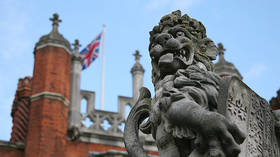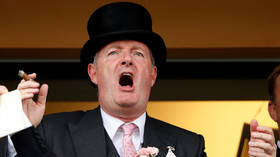Covid-19 & the strange death of English liberty: We were once freebooting pirates, now we churn out fear-stricken weaklings

Britain’s decision to lock down the country in the face of the coronavirus is the biggest limitation on civil liberties since World War II, but almost nobody has opposed it. How have we turned into a nation of sheeple?
When Prime Minister Boris Johnson proposed that everybody would be made to stay at home under house arrest, even his most fervent critics cheered. Radical left-winger Owen Jones said that he had “never thought I'd be relieved to be placed under house arrest along with millions of people under a police state by a right-wing Tory government” – and yet he was.
There was no vote in Parliament on the emergency measures; they were just nodded through. Just when you might have thought that the government ought to be held to account, Parliament went into recess for a month.
In the first two weeks of the lockdown, police in Manchester broke up 494 house parties, 166 street parties, 122 social gatherings and 173 groups in the parks. By the end of April, police had issued 9,000 fines to people for being out of their homes.
Astonishingly, 200,000 Britons reported their neighbours and fellow citizens to the police for breaking the lockdown.
Some Britons, surprised at the way they have been dealt with, have posted videos of high-handed police threatening arrest – even threatening to fit someone up in one case – and blaming those who answer back, with retorts such as accusing them of “killing people.” For the most part, though, Britons have embraced the lockdown and the loss of liberty it represents.
It is astounding how acquiescent people have been. Surely, we would have fought back under a military dictatorship. But then, many people in dictatorships accepted the myth that they were under danger from subversives, accepting restrictions on their liberties as the price of security.
British acquiescence to the lockdown might not seem surprising when you think of the unknown danger that the coronavirus represented back in March, when the government and the public first started to look at the problem.
The high numbers of those who had died lent moral force to the demands for the UK to be locked down. Still, the way that the country reacted to this crisis tells us a great deal about the way that Britain – and Britons – have changed over the last three decades.
English liberty, we often claim, is in our DNA. This island race fiercely defends its freedoms, we thought. The struggle for freedom is indeed fundamental to English history – though it was always at war with those other national traits, authoritarianism and subservience.
The free-born Englishman of Elizabethan times all too happily trod on his neighbours’ rights as he claimed his own, but they in turn rose up and demanded their just freedoms. The cussed Presbyterians of the Scottish lowlands, the sturdy yeomen of Cromwell’s New Model Army, Young Ireland, the People’s Charter, Mrs Pankhurst’s Suffragettes, the post-war teenage rebels, Women’s Liberation and the Brixton rioters – all have helped to enrich the story of English liberty with their own brilliant chapters.
Yet, with one or two exceptions, the government has come under no criticism for its high-handed and oppressive clampdown. What has happened to our proud tradition of liberty?
Also on rt.com UK elites’ Covid-19 PROJECT FEAR has worked, as NEARLY ALL Britons DEMAND lockdown continues despite falling casesIn the years since the end of the Cold War, British liberty has been on the back foot. A much stronger sense of insecurity has shaped public policy and social interaction in recent times. Fear, and the management of risk, has been the dominant theme in governing Britain. The archetypal Briton of today is less likely to be a freebooting pirate than a vulnerable individual in need of protection. It is not surprising that a large majority do not want to end the lockdown.
Many of our laws and institutions have been re-cast around the idea of protecting the vulnerable, a theme which has dominated public life. A quarter of a century ago, the Labour Party was struggling to make itself relevant. Pollster Philip Gould wrote the party a paper on the “fear factor in politics,” in which he argued that while the right had always campaigned on a basis of fear, the left did so on hope. Almost inevitably, fear won. Fear is a more compelling emotion, more easily provoked.
The Labour Party countered the ‘fear factor’ not with hope, but with ‘fear factors’ of their own. One was that the NHS was in danger. Another was the fear of anti-social behaviour, which demanded special laws, including curfews for young people and close management of the ‘NEETs’ (those Not in Education, Employment, or Training).
Labour’s difficulty was that it had abandoned the social democratic aspiration of higher wages and collective bargaining. Instead, it succeeded by playing on people’s fears that they would be left behind in a dog-eat-dog capitalism. The two major parties in the 2000s coalesced around a common programme of illiberal social regulation, motivated as the protection of those ‘at risk’. With a decline in political contestation, politics stopped being about ideological differences – it was becoming depoliticised.
After nearly two decades of apolitical administration – first under Tony Blair, then Gordon Brown, and, without much of a shift, under David Cameron’s Conservative Party – the last three years have been a barnstorming polarisation.
With the Labour Party shifting much further to the left under Jeremy Corbyn, and the eruption of the Brexit referendum, it certainly seemed as if politics was becoming much more contested. All sides in the intense debate over Britain’s future put their arguments in terms of liberty and popular democracy.
Remainers rallied for ‘freedom of movement’ and even protested that Boris Johnson’s government was threatening a ‘coup’. Brexiteers also fought for an idea of English liberty, and even made fun of their opponents for mobilising ‘Project Fear’. The spirit of liberty seemed to be in good health.
However, underneath the rumbustious Brexit debates, there was also the reassertion of the more defensive, fear-driven trend.
In my opinion, the Corbynites made a terrible mistake by not backing Brexit – one which cost them the 2019 election. Worse, it threw them back onto the old ‘politics of fear’. Their appeal as the election approached was once again ‘protect the NHS’. Labour activists seemed to look on the whole Brexit debate as a dangerous slide into racism. Hope played too little part in their campaign, and fear too great.
Boris Johnson’s incoming administration made great claims to stand on the ground of English liberty. “I think the people in this country have had enough of experts,” Michael Gove, Minister for the Cabinet Office, said back in 2016. But once in power, Johnson and Gove caved in to the experts who told them that 500,000 would die if the country was not locked down.
With the economy set to shrink by a third this summer, Downing Street says it is looking for a way out of the lockdown, and rightly so. More than just pounds and pence, the lockdown is crippling our freedom. Johnson’s difficulty is that the only criticisms that they are facing are from those who blame them for being too lax.
Worse, it seems that many of our rulers like a country where the population is atomised, locked up at home and regaled upon to cheer the NHS from their doorsteps on a weekly, regimented basis.
Think your friends would be interested? Share this story!
The statements, views and opinions expressed in this column are solely those of the author and do not necessarily represent those of RT.















